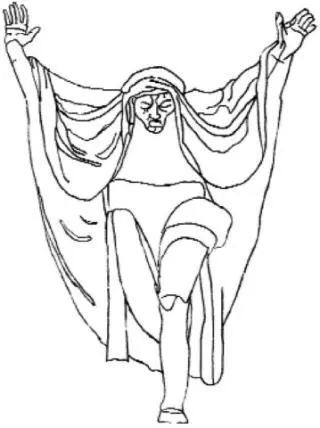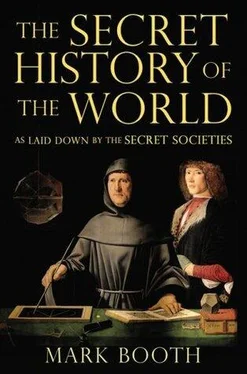Philip cast about for the greatest mind of the day to be his son’s tutor, and chose Plato’s greatest pupil, Aristotle. Alexander and the older man recognized each other as kindred spirits.
As soon as Plato gave formal, conceptual expression to idealism, it was inevitable that its opposite would quickly be formulated. Instead of deducing the truth about the world from immaterial, universal principles, Aristotle collected and classified the data of the material world. He worked out physical laws by a process of abstraction. Aristotle was therefore able to invent an entirely new and modern way of describing the hidden powers that shape nature. It is often said that the Roman Empire provided a vehicle for the spread of Christianity, and in the same way Alexander created the largest empire the world had yet seen. This, then, became the vehicle for Aristotle’s philosophy.
Philip was assassinated when his son was only twenty, but immediately Alexander established himself as a ruler of genius and an unbeatable military commander. In 334 BC he led an army into Asia, defeating the Persians at the Battle of Issus, even though they were outnumbered by as many as ten to one. Then he swept south through Syria and Phoenicia, before conquering Egypt, where he founded the city of Alexandria. Wherever he went he founded city-states on the Greek model, spreading Greek politics as well as Greek philosophy.
It was part of Alexander’s mission to save the newly evolved consciousness, forged by initiates such as Plato and Euripides, from being swamped by the greater wealth, grandeur and military might of Asia. More particularly, he was to save the new rationality from being swept away by ancient ritualistic clairvoyance and picture-consciousness.
In 331 BC Alexander defeated the Persians again, destroying their ancient capital of Persepolis, before pushing further into Afghanistan and finally into India. There he debated with Brahmin philosophers, the descendants of the Rishis. Admitted to watch the sacred, initiatory rites of the Brahmins, Alexander’s own priests were astonished to see how similar the ceremonies were to their own.
There is a story that Alexander sent a Greek philosopher to summon a Brahmin teacher into his presence, offering great rewards and threatening decapitation if he refused. The philosopher finally tracked down the Brahmin in the depths of the forest and received the following rather dusty response: ‘The Brahmins neither fear death nor desire gold. We sleep deeply and peacefully on forest leaves. Were we to have any material possessions, this would only disturb our slumber. We move freely over the surface of the earth without conflict and all our needs met as by a mother who feeds her baby her milk.’
This was a rare knockback for Alexander. Until the near the end of his life it seemed no one could stand in his way. As has happened only a few times in history, an individual seemed able to bend the whole world to his will.
As I’ve suggested, Alexander’s entire life can be seen as a quest to understand the origins of this divine power. At different times both Perseus and Hercules were claimed as his ancestors, according to variant traditions. Aristotle had given Alexander a copy of Homer’s Iliad , which he learned off by heart, and he sometimes saw himself as a demi-god like Achilles. In 332 BC he went on an expedition to the temple of Amun at the desert oasis of Siwa, some five hundred miles west of Memphis in Egypt. It was said he nearly died on this expedition, though this may be a reference to a ‘mystical death’. What is certain is that he was ‘recognized’ by the priests and initiated there.
It is sometimes speculated that the priests might have told Alexander he was a son of Amun-Zeus. It is supposed that the ceremonial horns he took to wearing afterwards were a mark of this. In some countries he conquered he was remembered as a horned man. In the Koran he appeared as Dhul-Qarnayn, which means ‘the two-horned one’. But according to the secret history, these horns are the horns of a hunter we have already met, and the two fiercely loving friends Gilgamesh and Enkidu, separated by the untimely death of Enkidu, were reunited when they reincarnated as Alexander and Aristotle.
At the age of only thirty-three Alexander ignored warnings by the astrologers of Babylon not to enter their city gates. Two weeks later he died of a fever. It would soon become apparent that Alexander’s empire had been held together only by his personal magnetism.
BUDDHISM EMERGED AS THE FIRST PROSELYTIZING, missionary religion in about 200 BC. Before then the religion you believed in was determined by your race or tribe. Now the human condition was changing. For the uninitiated the spirit worlds were a fading vision, leaving faint traces hard to be certain of, difficult to discern. Inspired by Pythagoras, Socrates, Plato and Aristotle, people were developing a capacity for deductive and inductive thought. They were able to weigh up arguments on either side.
By 140 BC Rome was the capital of the world and a vortex of ideas. A citizen might have very different belief systems to choose from: the official cult of the planetary gods, the neo-Egyptian worship of Serapis, Epicurianism, Stoicism, the philosophy of the Peripatetics and the Persian cult of Mithraism. Buddhist monks and Indian Brahmins had certainly reached Alexandria.

Virgil from a painting by the Swiss-born artist Henry Fuseli. Virgil was the great initiate poet of the founding and destiny of Rome. Aeneid vi 748-51 gives expression to the doctrine of reincarnation, of the spirit’s ‘desire to return to the body’ when a thousand years comes round.
For the first time in history choosing one of these belief systems could be a matter of personal choice.
Individuals might choose in proportion to the evidence or they might choose what they wanted to believe. With the rise to dominance of the Roman Empire, therefore, we reach the age of inauthentic faith, with a cynicism and conscious cultivation of sensibility that was entirely new.
When we think of Rome we picture sophistication and grandeur but also paranoia. If we compare the Greece of Pericles with the Rome of the Caesars, we see in the latter the same kind of overbearing pomp, elaborate, awesome rituals of smoke, incense and clashing cymbals that had earlier been used to hypnotize the peoples into obedience to Baal. Now it was used to hypnotize people into believing that various strange and egomaniacal members of the ruling elite were in fact gods.
The Caesars forced the Mystery schools to initiate them. In the process they discovered the ancient initiatic teachings regarding the Sun god.
Julius Caesar eradicated the Druids because of their teaching of the Sun Mysteries — that the Sun god was soon to return to earth. Similarly Augustus banned astrology not because he disbelieved in it, but because he was anxious about what astrologers could see written in the sky. If the people could not read the signs of the time, he could perhaps get away with representing himself as the Sun god. Because he had been initiated, Caligula knew how to communicate with the spirits of the moon in his dreams. But because he had gained initiation by force and without proper preparation, he could not properly identify them. Caligula would refer to Jupiter, Hercules, Dionysus and Apollo as his brother gods, sometimes appearing in fancy dress to look like them. Nero’s reign of madness reached a climax when he realized he was not after all the Sun god. He would rather burn the whole world to the ground than let another, greater, individual live.
THE GOLDEN ASSE OF APULEIUS IS ONE of the great initiatic works of the Roman period. It contains a wonderful story concerning the life of the spirit. Cupid and Psyche carries familiar and fairly conventional warnings about the dangers of curiosity, but it also has an esoteric and historical level of meaning.
Читать дальше













